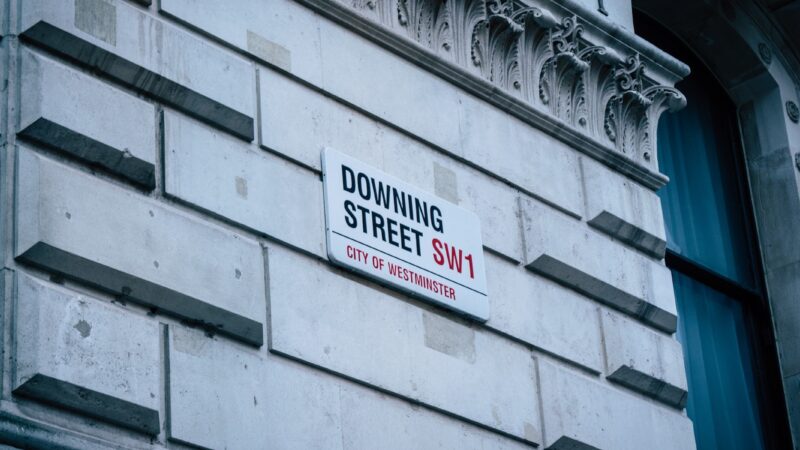Soundbites Over Sound Ideas
‘It’s a no to NOS.
We will ban nitrous oxide, also called laughing gas, putting an end to the littering of empty canisters and intimidation in local parks.’
This tweet by Downing Street earlier this year tells you everything you need to know about its policies. In an attempt to curb antisocial behaviour and littering, the government wants to ban nitrous oxide, more commonly known as laughing gas.
Seriously.
Ok, is it the worst policy in the world? No. It’s probably one that most people would agree with. The problem is that the government has said that banning it would end the issues described. It’s a plaster on a stab wound.
That’s what the government likes to do. It likes to offer pretty promises that won’t do anything to curb real issues.
Anti-Social Behaviour
Anti-social behaviour is evident in our communities. The elderly may grumble about how ‘kids in my day had more respect’ and to give them credit, they’ve got a point.
Society has a lot to say as to why this is. One reason given is the destruction of the nuclear family, especially fatherlessness. Studies have shown that children who grow up in single-parent families, particularly those without a father present, are more at risk of becoming criminals. Others point to a lack of discipline in the home and school. Scottish teaching unions warn that teachers are at risk of dismissal and unfair treatment when disciplining children.
Banning nitrous oxide will not solve the problem of anti-social behaviour. They will still drink and smoke weed and cause chaos. They will continue because they know that they can get away with it. The government and other authority groups are yet to actually come up with a solution to these problems. If they continue to allow criminals to get away with things, then they will.
Labour often blame the Conservatives for this. The usual line is that the Tories have slashed funding for youth and community centres, which encourages crime and anti-social behaviour. This is an argument many refute. Many live in areas with parks and swimming pools and leisure centres. These are free and accessible activities. Bored kids don’t go out and rob. These are kids with no discipline or regard for other people. It’s easy to find something to do these days. Instead, lack of discipline and glamourising such a lifestyle fuels this epidemic.
Obesity
The Welsh government has unveiled plans to restrict 2-for-1 deals, multibuys and other deals on ‘unhealthy’ foods. They have argued that it will help decrease obesity and diabetes.
The English government did a similar thing in 2022, banning sweets and junk foods from being displayed near tills.
The logic behind them is as follows: it will stop people impulsively buying junk food and will prevent kids from begging their parents for treats at the till. Suddenly, obesity and diabetes will drop.
Sure.
Obesity is more than just junk food. Firstly, perhaps the government should acknowledge that a lot of parents and people in general have a thing called self-control. They can easily avoid sweets or just tell their children ‘no.’ Sure, some may fall into it, but many can resist temptation.
Secondly, people will also still go down the sweet aisle. They will still get treats, even if they’re a little further down.
Thirdly, the government can bog off controlling lives.
In a cost of living crisis, one would think making things more expensive is just a bad idea. If the government was to actually tackle costs, then maybe healthier food would be easier to buy and make. They cannot get rid of convenience, but it would be nice if prices were better. With more and more people feeling the squeeze, the idea of affordable good food is a tempting one indeed.
One must also factor in things like exercise. Eating alone does not solve health problems. Once again, our elders will complain that kids don’t go outside because they’re glued to a screen. I don’t like to give it to them, but again, how often do you see a toddler being pacified by a tablet?
Both indoor and outdoor sports are easily available. It does not even have to be organised- anyone can have a kickabout in the park. Perhaps we could encourage more PE and sports at school. It’s not just kids either- we should all move about a little more.
Heat
Once again, the government wants to ban something. This time, it’s oil boilers that are on the chopping block. The plans would see those not connected to the gas grid be forced to find a new source of heat.
Having new boilers and heat sources installed is not cheap- it can cost up to tens of thousands to replace. That is money not many people have. Add that to high heat and energy bills, mix in the cost of living crisis, and you have a terrible policy.
The plan is a clear attempt to win over environmentalists. Politically, it’s extremely stupid. Most hardcore environmentalists won’t vote Tory anyway. Secondly, rural areas are usually Conservative. Annoying your voters is not a great idea, especially when you’re lagging in the polls.
It’s a policy that is not only politically useless, but it’s actively hurting people’s finances. Once again, the government claims to know best. It’s a pretty soundbite policy, but not a solution.
Once the government decides to find actual solutions- or even just stick their noses out- things could actually improve a bit. Instead, they just focus on nice graphics and soundbites sent out by their press officers. It’s idealism and stupidity in equal measure.
Political spin seems to be the in thing. They tell us what they think we’d like to hear as opposed to using their limitless powers to help. If they are going to get involved in our lives, then let it be for the better.
Soundbites don’t work and the second the government realises that, then progress can be made.





The UK has a child obesity problem and tax cuts are the solution
Today, nearly 30% of children in the UK (Year 6 and younger) are classified as ‘Overweight or obese’. This figure raises serious public health concerns, as it means many children in the country are not just facing early health scares in their youth, but also potentially lifelong healthcare issues.
Recent studies have revealed that one-third of children now leave British education overweight or obese. So, it’s safe to say that the UK is grappling with a severe child obesity problem – as this aptly titled article suggests.
We need to identify the factors driving this increase, which will soon become evident, and the issues exacerbating the situation.
Historical data on obesity and overweight statistics from 1974 to 2006 show an average annual increase of 0.47%, rising from 9.7% in 1974 to 25.3% in 2006. Based on this trend, we would expect the current statistic to be around 27%. However, the actual figure exceeds this projection, reaching around 30%, or in some cases, such as Hartlepool and Middlesbrough, as high as 42.6%.
The Recession
The recession and financial crash not only caused widespread unemployment and economic instability but also led to a boom in fast-food establishments.
Before 2008, Little Chefs were a common sight on British roads. Today, however, the landscape is dominated by the golden arches of McDonald’s, the flame-grilled burgers of Burger King, and the “finger-licking” goodness of KFC. These fast-food giants are now omnipresent, not just on roadsides but also deeply embedded in every facet of towns and estates.
This proliferation of fast-food outlets is not merely coincidental but a reflection of changing consumer behaviours during tough financial times.
While I occasionally indulge in fast food, there is a stark difference between my infrequent visits and the daily fast-food consumption habits of many younger children in modern Britain. According to a 2021 BMJ study, 10% of children consume fast food daily, and more than half purchase food from fast-food or takeaway outlets at least twice a week. This staggering reality highlights a significant shift in dietary habits with concerning long-term health implications.
It might seem harsh to blame the recession for yet another issue, but the evidence is compelling. While the broader economy struggled and many sectors faced downturns, the fast-food industry experienced a surge.
According to the Financial Times, the number of fast-food chains in cities across the UK increased by 8.2% in 2009, following a 6.6% increase in 2008. The rise in fast-food outlets, particularly during an economic downturn, demonstrates the fast foods sector’s resilience and profitability amid financial distress, highlighting the ubiquitous presence of fast food in our society.
So, while the broader economy struggled to recover, the fast-food industry appeared largely unaffected by the recession’s impact.
Perceptions of the costs associated with fast food
Although, and through a Government policy lens it might sounds like an effective strategy to increase the NHS’s messaging that “fast food is bad and home food is good”, we must explore why people go to fast food restaurants.
A 2022 study shows that 32% of people stated that they ate fast food because it is cheap. Now regardless of how true this is, why do people think this? Part of the reason lies in pricing strategies, like that of McDonald’s, which has remained relatively stable.
In 2008, McDonald’s introduced their saver menu, featuring the now legendary Mayo Chicken priced at 99p. Fast forward to 2023, and the Mayo Chicken now costs £1.39, representing a 40.4% increase. Meanwhile, the Bank of England has confirmed that from during the same period, the British pound has inflated by 55%, with £1 in 2008 now equivalent to £1.55. For struggling families, this suggests that in a world where supermarket products like olive oil have seen price hikes of up to 115%, fast food remains one of the few goods with consistent and reliable pricing.
However, the crucial message that the government and councils need to convey is that cooking at home is a more cost-effective option. Despite price increases in certain supermarket goods, cooking at home remains healthier and cheaper. Yet, in my opinion, this is almost an undeniable fact – most people are aware of it. The real challenge lies in breaking the psychological barriers that perceive McDonald’s competitive prices as low and consistent, coupled with its convenience and quick service.
Why we need to prioritise healthy eating vs exercise
Physical activity is essential for children to maintain fitness and a healthy weight. Studies show that children today take 90 seconds longer to run a mile compared to kids in 1975. However, while physical activity is important, it’s only one piece of the puzzle.
Dietary research supports this. Approximately 80% of your weight is influenced by diet, with exercise contributing the remaining 20%. Therefore, promoting healthy eating habits should be our primary focus when addressing child obesity.
This emphasis on nutrition is crucial, particularly considering the alarming trend of reduced time allocated to cooking meals.
Researchers have observed a significant decline in cooking duration over the past three decades, with this time decreasing by almost a minute each year – from a full hour in 1980 to just 34 minutes today. In fact, a staggering 52% of Brits now spend less than 30 minutes on meal preparation.
Policy Recommendations
The new Labour Government has confirmed that advertising to children will be a focus of their national health policy. They plan to empower the Advertising Standards Authority (ASA) to regulate the amount of fast food, vaping, and other harmful product advertisements targeting children. While this is a step forward, it is a very small one and its impact may be limited.
Major fast food brands like McDonald’s have become so ingrained in our daily lives that even if they ceased advertising for the next 20 years, people would still know where to find them. Given that 10% of children consume fast food daily, the effect of reducing advertisements alone will likely be minimal. Therefore, the government should consider additional measures.
The Argument for Tax Cuts on Healthy Foods
The Government needs to act quickly.
We find ourselves in a situation reminiscent of the 2000s recession, with people short on cash, grappling with higher shopping bills, and generally disheartened by their finances.
So what can we do?
Let’s start with an option the Government has direct control over: tax policy. Contrary to Labour’s usual stance on increasing taxes, I propose doing the opposite by providing targeted tax cuts for food producers and supermarkets that sell healthy foods.
To make healthy eating more appealing, the government should consider implementing tax cuts specifically for healthy foods. By reducing the cost of nutritious options, people might be more inclined to choose them over fast food. Additionally, supermarkets could receive tax breaks for meeting certain quotas of healthy food sales.
This would somewhat replicate the successful South Korea model, where the government provides tax cuts and subsidies to farmers who produce fruits and vegetables, aiming to make healthy foods more affordable and accessible to the public.
The South Korean government also promoted healthier eating through the implementation of “healthy food corners.” These corners, launched by the Ministry of Food and Drug Safety, mandated that stores set aside dedicated sections for healthier food options. These sections prominently feature products with lower sodium, sugar, and fat content, making it easier for children to make healthier choices.
Support School Restriction Zones (Planning Policy)
While I believe that tax cuts are the most effective and well-placed policy approach, it is essential to consider other options that health bodies have proposed to central government and local authorities.
One effective strategy used by local authorities is to implement School Restriction Zones.
This policy prevents new fast-food or hot-food restaurant planning applications within 400 meters of a school. Evidence shows that proximity to fast-food outlets significantly increases the likelihood of students being overweight or obese.
The Issue: without government backing, local councils may face legal challenges from planning applicants, potentially costing them money and leading to the construction of more fast-food establishments near schools.
Junk Food Tax
Labour will love this one.
Similar to the sugar tax on sugary foods, a “Junk Food Tax” could challenge the affordability of fast food while increasing government revenue.
This policy could help change the perception that fast food is a cheap option, acting as a deterrent without restricting consumer choice. Though it may seem like a centralising measure, there is a strong case for its introduction, as evidenced through its effectiveness in Mexico.
Parent Supervision Policy
A potential, albeit controversial, measure could be requiring children under a certain age to be accompanied by an adult to purchase fast food.
This policy would aim to curb the habit of children frequently visiting fast-food outlets without parental guidance. However, this would be difficult to enforce and would not be appropriate, as it limits children’s autonomy and access to food.
Conclusion
Among the various solutions, implementing tax cuts for healthy foods stands out as the most effective and balanced approach.
Unlike restrictive policies that infringe on individual autonomy, this strategy makes nutritious options more competitive, supports British farmers, and promotes healthier eating habits. By making healthy foods more affordable and accessible, we can shift consumer behaviour away from fast food and towards home-cooked meals.
The current state of child obesity in the UK is unsustainable, and without swift intervention, the NHS will face overwhelming pressure from an aging population struggling with obesity-related health issues.
Tax cuts for healthy foods provide a practical, immediate, and sustainable solution that benefits both public health and the economy.
Photo Credit.